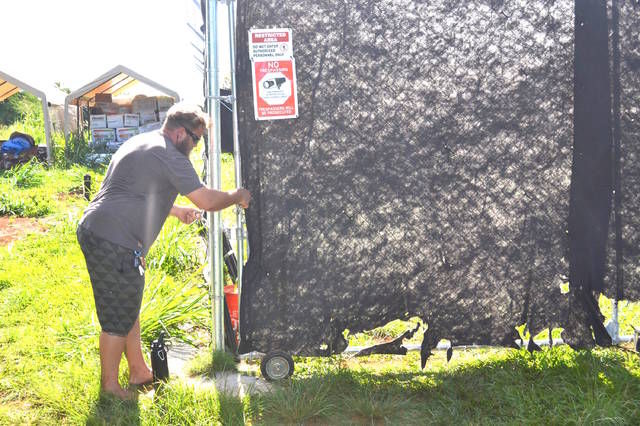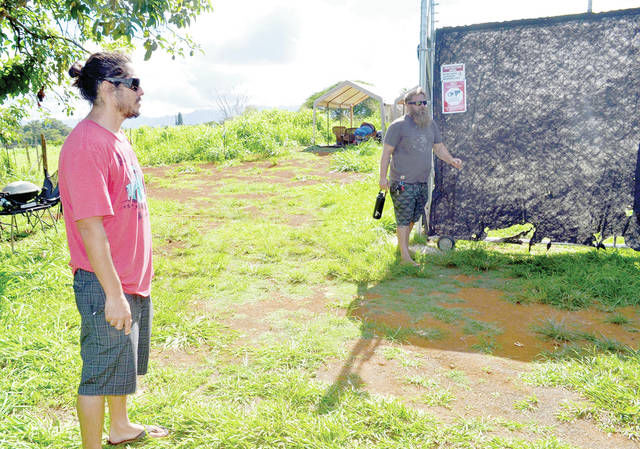LIHUE — After almost 20 years since legalization, medical marijuana patients on Kauai may be able to purchase state-approved cannibas by October. Green Aloha Ltd., the sole approved medical marijuana dispensary on Kauai, is planning to start growing medical cannabis
LIHUE — After almost 20 years since legalization, medical marijuana patients on Kauai may be able to purchase state-approved cannibas by October.
Green Aloha Ltd., the sole approved medical marijuana dispensary on Kauai, is planning to start growing medical cannabis at its transitional facility as early as next week, pending its occupancy permit. The temporary grow location would supply the over 1,600 patients on Kauai a yield of about 30-40 pounds of cannabis a month.
“Ever since I was a kid I wanted to create a sustainable ag business to provide quality jobs and a positive service to our community,” said Justin Britt, Green Aloha Ltd. CEO. “Being honored by the state with the responsibility of implementing the dispensary on the island where I grew up is a dream come true.”
The 3,700-square-foot transitional facility cost the company about $500,000 to build. Britt said the plan is to construct two permanent 20,000-square-foot grow facilities in the next three years. Each building is allowed to house 3,000 plants.
The dispensary will be located on 2944 Aukele St. in the Lihue Industrial Park Phase II, and will offer patients over 20 varieties of cannabis.
“Buying from a dispensary rather than the black market provides a safe, reliable source for patients to obtain their cannabis; ensures the medicine is free of any mold, mildew or pesticides; regulates access only to adults; and creates tax revenue, all at a price competitive with the black market,” Britt said.
Theresa Koki, Life Choices Kauai coordinator, said the county program has a zero tolerance for drugs. However, she believes cannabis produced in a state-approved facility will be more beneficial for patients rather than purchasing the drug from the black market.
“If it grows in the facility, like the one he’s planning to have with all the protocols in place, it’s going to be a much cleaner product, I believe,” she said. “What people are getting in the black market is not necessarily the quality of what he’s required by the state to go through: Checking for mold, non-gmo, levels of THC all get protocolled. I think it’s going to be much safer for people.”
Koki’s main concern is medical marijuana getting into the hands of parents.
“There are parents who drink and get drunk while they’re supposed to be raising their kids. Now they’re going to be on marijuana,” she said. “I worry about custody cases: Stuff about a person who won’t have supervision of their children. It’s a mood- and mind-altering substance.”
Steven Yost, Green Aloha’s head grower, has run similar medical marijuana facilities in Washington.
He said the facility on Kauai is top-notch.
“It’s nice to see Hawaii launch a program like this that’s still very state regulated. There’s a lot of oversight, testing, a lot of responsibility,” he said. “Because we have this testing here, we can test for microbes, mold, pesticides that aren’t allowed. You know exactly what you’re getting. To me, if it’s regulated, it’s medicine.”
Located on a 20-acre property, the transitional facility is equipped with four flower rooms and cameras in every room — including scales — to prevent corruption.
Each room will produce harvested cannabis on a 10-week cycle, with new medicine available to patients every two and a half weeks.
Because of limited product, Britt said prices per gram may be as high as $15. His target rate, however, is going to be $10 to $12 a gram.
In about a year, he would like the price of medical cannabis to be $250 an ounce, a target close to the black market price.
As of May 31, 2017, the state Department of Health had a little over 17,000 registered patients in the state.
Britt projects creation of 10,000 jobs for the island in the next five to 10 years.
In addition to the Lihue dispensary, he would like retail locations in Kapaa, North Shore and Westside.
For Green Aloha, it’s about the quality of medicine for patients.
“We’re taking (a) different approach than most people are taking throughout the U.S., which is about high yields, profitability,” Britt said. “We’re about clean medicine and doing it organically and naturally.”



